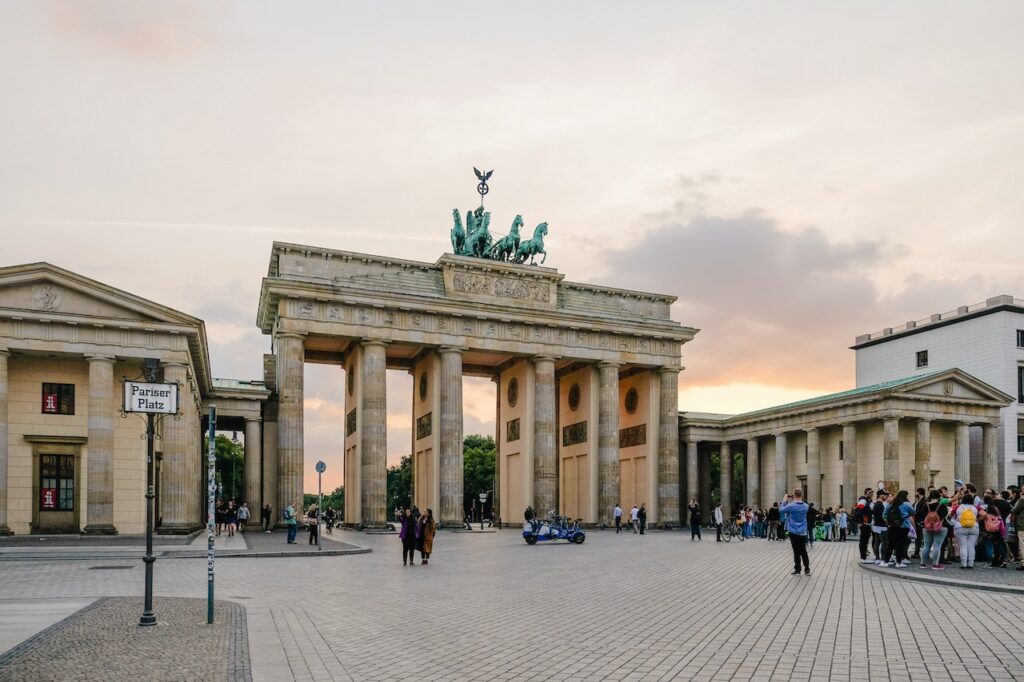Normal 0 false false false EN-US X-NONE X-NONE /* Style Definitions */ table.MsoNormalTable {mso-style-name:"Table Normal"; mso-tstyle-rowband-size:0; mso-tstyle-colband-size:0; mso-style-noshow:yes; mso-style-priority:99; mso-style-parent:""; mso-padding-alt:0in 5.4pt 0in 5.4pt; mso-para-margin:0in; line-height:115%; mso-pagination:widow-orphan; font-size:11.0pt; font-family:"Arial",sans-serif; mso-ansi-language:EN;}
Plug For Germany: What You Need To Know

What is the plug for Germany? Before you travel, check the information below to make sure your electronic devices are compatible with the outlet type and voltage.
Electrical Summary
Plug Compatibility: Type C, Type F
Voltage: 220V – 240V
Frequency: 50 Hz
Type C

Type F

Can North Americans use Electronics in Germany without an Adapter?
No! North Americans will need an adapter for the outlets and a transformer for the voltage when traveling to Germany. North Americans device plugs will not work with the outlet types in Germany. Also, the voltage in Germany is different from North American voltages.
Can Europeans use Electronics in Germany without an adapter?
Yes! Europeans do not need a travel adapter or transformer when traveling to Germany. Most device plugs will work with the outlet types in Germany. Also, the voltage in Germany is the same as in Europe.
What Outlet does Germany Use?
Type C

Type C plug sockets are used in Europe, Africa and Asia. They have two round pins and no grounding pin. These plugs are typically used with devices that have a voltage of 220-240V. This outlet is rated for 2.5 amps. Plug Type E, and Type F are compatible with this socket. All other plug types will need an adapter.
Type F

Type F electrical plug sockets are used in Germany, Spain, Italy and some parts of Africa. They have two round pins and a grounding pin. These outlets are typically used with devices that have a voltage of 220-240V. This outlet is rated for 16 amps. Plug Type C and Type E are compatible with this socket. All other plug types will need an adapter.
Is it safe to drink water in Germany?
Yes, it is generally safe to drink tap water in Germany. The country has very high standards for drinking water quality, and the tap water is regularly monitored to ensure that it meets these standards.
In fact, tap water in Germany is often considered to be of high quality and taste, and many people prefer it over bottled water. However, as with any country, there may be variations in water quality depending on the specific region or municipality.
If you have any concerns about the safety or quality of the tap water in Germany, you can check with the local authorities or your accommodation provider. Additionally, bottled water is widely available in Germany if you prefer to drink it instead.
We recommend always packing a filtered water bottle when traveling:
Travel Essentials
Be sure to check our list of travel essentials before your trip!
Should I get travel insurance when traveling to Germany?
It is generally recommended to get travel insurance when traveling to a different country. Travel insurance can provide financial protection and peace of mind in case of unexpected events, such as medical emergencies, trip cancellations, lost or stolen baggage, or other travel-related mishaps.
Travel insurance can cover various expenses related to your trip, such as medical expenses, emergency medical transportation, trip cancellation or interruption, lost or stolen baggage or personal belongings, and other travel-related expenses.
Before purchasing travel insurance, it’s important to carefully review the policy details, including the coverage limits, exclusions, and any applicable deductibles or copays. You should also make sure that the policy covers any activities or destinations that you plan to participate in or visit during your trip.
Travel Summary
Germany is a beautiful country located in Central Europe, known for its rich history, stunning architecture, and vibrant culture.
The capital city, Berlin, is a top tourist destination, known for its world-class museums such as the Berlin Wall Museum and the Pergamon Museum, as well as its iconic landmarks such as the Brandenburg Gate and the Reichstag Building. Visitors can also enjoy the city’s vibrant nightlife, delicious cuisine, and cultural events.
Beyond Berlin, there are many other regions in Germany that are worth exploring. The Bavarian Alps, located in the south of the country, are famous for their stunning natural beauty and outdoor activities such as skiing, hiking, and mountain climbing. Visitors can also enjoy the region’s delicious food and charming towns such as Munich and Rothenburg ob der Tauber.
The Rhine River Valley, located in the west of the country, is another popular destination known for its beautiful landscapes, historic castles, and charming towns. Visitors can enjoy scenic cruises along the river, explore the region’s vineyards and wineries, and visit historic landmarks such as the Heidelberg Castle.
Overall, Germany is a beautiful country with a rich history and culture, stunning architecture, and delicious cuisine. It is a must-visit destination for anyone looking for a unique and memorable travel experience in Central Europe.
Traveling to another country? Check out our Countries page for more info.